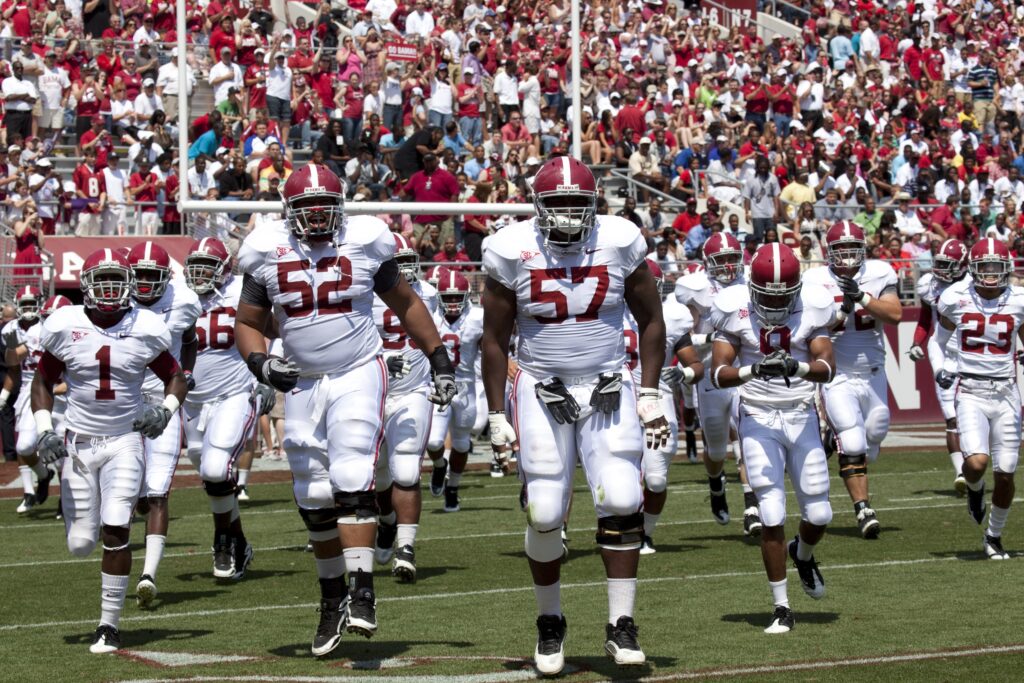College Football Playoff Schedule

The College Football Playoff Schedule will end in the culmination of the National Championship game in California. For the 2022-2023 season, the Georgia Bulldogs defeated the TCU Horned Frogs 65-7 to capture their second straight college football playoff national championship.
The four teams selected to the 2022-23 College Football Playoff will be announced after conference championships are completed in December. Who are you rooting for? According to the AP Top 25, the top 4 teams are Georgia, Ohio State, Tennessee, and Michigan.
Table of Contents
Our Love of College Football Playoffs
The sun had barely risen, casting a golden hue over the sprawling college campus. The air was thick with anticipation. It was that time of the year again – the culmination of blood, sweat, and countless hours on the field. The College Football Playoff season was upon us, and every fan, player, and coach felt the electric charge in the atmosphere.
The College Football Playoff (CFP) is not just a series of games; it’s a dance of strategy, skill, and sheer will. The schedule, often seen as a mere list of dates and matchups, is in reality a roadmap to glory, a testament to a team’s journey through the season, and a predictor of the battles ahead.
The playoff begins with the selection process. A committee of experts, former players, and coaches convene to decide the top four teams that will compete for the national championship. This decision is based on a myriad of factors: win-loss records, strength of schedule, head-to-head results, and even injuries. The tension in the room is palpable as they debate, argue, and finally, select.
Once the teams are chosen, the real drama begins. The first round, known as the semifinals, sees the number one seed pitted against the fourth, and the second seed facing the third. These games are not just battles between teams but also between philosophies, coaching styles, and legacies.
The venues for these epic battles are iconic in their own right. Rotating among six major bowl games, the settings provide a backdrop of history and grandeur. From the sun-kissed fields of the Rose Bowl in Pasadena to the raucous energy of the Sugar Bowl in New Orleans, each stadium adds its own flavor to the mix.
As the semifinals unfold, stories emerge. The underdog team that nobody believed in, defying odds and naysayers. The star quarterback, shouldering the weight of his team’s hopes, delivering a performance for the ages. The rookie coach, proving his mettle on the biggest stage. Every play, every decision, every moment is magnified, dissected, and remembered.
The two victors of the semifinals then prepare for the ultimate showdown: the National Championship game. This is where legends are born. The stakes are sky-high, the pressure immense, and the rewards unparalleled. Teams get a short breather, a few precious days to regroup, strategize, and heal before the final clash.
The championship game is more than just four quarters of football. It’s a spectacle, a celebration of the sport. Fans from across the country descend upon the host city, turning it into a carnival of colors, sounds, and emotions. Tailgate parties, fan zones, and pep rallies transform the city into a football fiesta.
And then, under the bright lights, amidst the deafening roars of the crowd, the two best college football teams in the nation collide. Every touchdown is ecstasy, every fumble a heartbreak. Coaches pace the sidelines, players push their limits, and fans live and die with every play.
As the final whistle blows and confetti rains down on the champions, the College Football Playoff schedule comes to a close. But its impact lingers. Players, whether they win or lose, carry the memories of the battles fought, lessons learned, and bonds forged.
In the world of college football, the playoff schedule is not just a sequence of games. It’s a journey, a saga, a testament to the spirit of the sport. It’s where dreams are realized, heroes are made, and legends are born. And as the fans depart and the stadiums empty, one thing is certain: the countdown to the next College Football Playoff has already begun.
Overview of College Football Playoff Schedule
The College Football Playoff (CFP) is a postseason tournament in American college football for the NCAA Division I Football Bowl Subdivision (FBS). It was created to determine a national champion for the FBS. As of my last update in September 2021, here’s how the CFP schedule works:
- Selection Process:
- At the end of the regular college football season and conference championship games, the CFP Selection Committee ranks the top 25 teams. The top four teams are then selected to compete in the College Football Playoff.
- These rankings take into account factors like conference championships won, overall record, strength of schedule, head-to-head competition, and other criteria.
- Semifinals:
- The semifinals typically take place on December 31st or January 1st, depending on the year and day of the week these dates fall on.
- The No. 1 ranked team plays the No. 4 ranked team, and the No. 2 ranked team plays the No. 3 ranked team.
- These games are played in a rotation among six major bowl games: the Rose Bowl, Sugar Bowl, Orange Bowl, Cotton Bowl, Peach Bowl, and Fiesta Bowl. Every year, two of these bowl games host the semifinal matchups.
- National Championship:
- The winners of the two semifinal games advance to the College Football Playoff National Championship game.
- This game is usually played on the first Monday that is at least 6 days after the semifinals.
- Unlike the semifinals, which rotate among the six major bowl games, the location of the national championship game changes every year and is determined by a bidding process. Different cities and stadiums can bid to host the game.
- Other Bowl Games:
- While the top four teams compete in the CFP, many other teams will play in various bowl games throughout December and early January.
- The CFP Selection Committee also determines matchups for the other “New Year’s Six” bowl games that are not hosting semifinals in a given year. These games feature highly ranked teams and other conference champions.
The CFP system has been both praised for allowing a more definitive way of determining a national champion and criticized for its subjective selection process and the limitation of only four teams. There have been discussions about expanding the number of teams in the playoff, but as of my last update in 2021, the format remains a four-team playoff.




